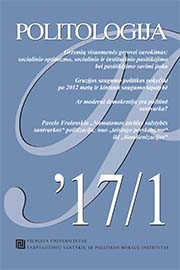Grėsmių visuomenės gerovei suvokimas: Socialinio optimizmo, socialinio ir institucinio pasitikėjimo bei pasitikėjimo savimi įtaka
The Perception of Threats to National Welfare: The Impact of Social Optimism, Self-Confidence, and of Social and Institutional Trust
Author(s): Irmina Matonytė, Vaidas Morkevičius, Ainius Lašas, Vaida JankauskaiteSubject(s): Security and defense, Welfare systems, Social psychology and group interaction, Demography and human biology
Published by: Vilniaus universiteto leidykla & VU Tarptautinių santykių ir politikos mokslų institutas
Summary/Abstract: Drawing on the concepts of national security, risk society and human development, in this article we analyze threats to the welfare of society. Our analysis is based on the social constructivist approach and a representative survey of the Lithuanian population (carried out by VILMORUS in spring, 2016; N = 1004). Our research confronts the holistic understanding of the welfare of a society, which ignores the possibility that individual categories of threats can have different effects on a society’s welfare (evaluations based on both objective and subjective criteria). By recognizing the emphasis of social constructivism on social values, as well as the socio-demographic and experiential factors in the formation of images and evaluations, we also pay attention to the role of trust in the perception of threats. Intervening into the academic debate on various aspects of trust and the role that they play in assessing threats to the welfare of society as well as the possibilities for empirical measurements, we distinguish four concepts of trust which are found in social psychology, social value and political culture studies. Our empirical analysis shows that although public views on the impact of threats are more or less affected by almost every aspect of trust (strong self-confidence and confidence in one’s future, social solidarity, institutional trust and optimistic attitude towards the world), the spectrum of their impact has considerable differences. It then goes to show that high level of trust reduces the negative impact of various threats, and vice versa. In the view of the Lithuanian society, there is a considerable likelihood of all indicated threats in correlation with relatively high negative impact. Lithuanian society is also characteristic of a chronic lack of trust in all its forms. In this article, we analysed different families of threats as discrete phenomena. However, our analysis also showed the relevance of an integrated concept of threats, meaning that the public tends to reduce threats to a common denominator and to evaluate them as quite coherent entirety. It highlights the analytical usefulness of a cultural perspective as highlighted by risk society paradigm. The importance of risk society principles in constructing attitudes on threats and in evaluating their impact is also evidenced by our main research result. Social optimism is the main and most important factor in the trust family which reduces evaluations of the threats. To be more exact, the data shows that social optimism along with institutional and social trust and self-confidence has a complex and differentiated effect on the individual perception of various threats (military, social, economic, ecological, political, moral-religious and health-related threats). Social optimism and trust in public administration authorities have the most visible effect on assessing the impact of threats. In terms of their receptiveness to trust factors, three clusters of threats can be distinguished. Military threats are a stand-alone category of threats the assessment of which is the least receptive to trust factors. In turn, political, ecological, health and moral-religious threats trust-wise are most receptive. Finally, social and economic threats relate to a more limited spectrum of trust than the latter but it is still wider than in the case of military threats. Our results also include recommendations for public policy decision-makers.
Journal: Politologija
- Issue Year: 2017
- Issue No: 1 (85)
- Page Range: 3-55
- Page Count: 53
- Language: Lithuanian

